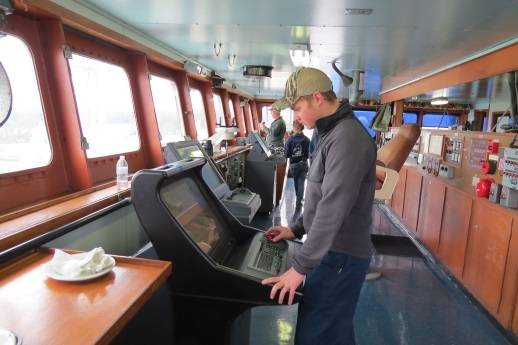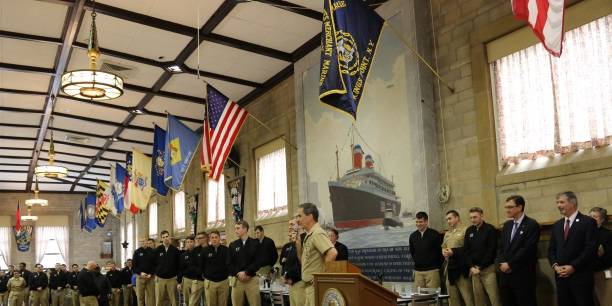On February 15, we announced that Sea Year training for U.S. Merchant Marine Academy (USMMA) Midshipmen will resume on three commercial carriers – Crowley Maritime Corporation, Maersk Line Limited and American President Line. This followed implementation of comprehensive new requirements for commercial carriers to ensure that the academy’s standards for behavior, leadership and integrity are upheld.
I’m now pleased to announce that last week another commercial carrier, TOTE Services, also has been certified under these strict new federal requirements to be “Sea Year Eligible.” The first Midshipmen have already begun their training aboard these commercial vessels, and the Maritime Administration (MARAD) is reviewing applications from five other companies that have applied to meet the new Sea Year requirements.
Sea Year has been a part of the fabric of USMMA at Kings Point since 1942. Through the decades, Midshipmen have participated in peacetime commerce, transported military supplies in every conflict from World War II onward – including operations Desert Shield, Desert Storm, Allied Force, Enduring Freedom, Iraqi Freedom and Inherent Resolve – and have been part of humanitarian missions to Haiti and Somalia.
Sea Year was suspended in June 2016 while MARAD examined ways to ensure that training was conducted in a safe and respectful environment.
Since that time, MARAD, along with the industry and unions, has worked to establish requirements for companies providing Sea Year training opportunities for Midshipmen. These requirements include zero tolerance for sexual assault and sexual harassment (SASH), vetted mentors, regular crew training and no fraternization between crew and Midshipmen. These requirements will be reviewed after six months and annually thereafter.
Sea Year is a collaborative effort between MARAD, the USMMA and commercial shippers that demonstrates how a public-private partnership between the government, private industry and labor can strengthen an incredibly important core training component for the academy and its Midshipmen.
To ensure the industry has access to training platforms that can be used while at sea, a consortium of maritime industry companies and labor organizations is working with MARAD to develop computer-based training programs and best practices to combat SASH. In addition, the National Defense Authorization Act for fiscal year 2017 requires a working group to report to Congress in September 2017 on efforts to further address SASH prevention and reporting.
For the Midshipmen who are assigned to train aboard U.S.-flag merchant vessels, these new standards illustrate that SASH in any form is unacceptable, and that we will do everything to safely train and protect the future leaders of America’s merchant marine.
Summary of Sea Year Criteria
To ensure that Midshipmen training on commercial vessels is conducted in a safe and respectful environment, the Maritime Administration (MARAD) formed a Shipboard Climate Compliance Team (SCCT) to work with industry partners in establishing stringent new requirements for companies providing Sea Year training opportunities for Midshipmen. These requirements include zero tolerance for sexual assault and sexual harassment (SASH), vetted mentors, regular crew training and no fraternization between crew and Midshipmen. The criteria will be reviewed after six months, and annually thereafter. A full list is provided below.
Annual Company-wide Zero Tolerance Message
Shipping company CEOs will issue an annual company-wide message outlining specific rules for the workplace, strongly stating that sexual assault and sexual harassment and retaliation based on a SASH complaint is unacceptable, and committing the company to working to eradicate it.
Annual SASH Prevention Training Requirement for Crew
The annual SASH prevention training will ensure that crewmembers clearly understand what constitutes sexual assault and sexual harassment, its negative impact, the importance of prevention and the severe penalties for engaging in prohibited behavior or for failing to report an incident. All crewmembers will clearly understand their responsibility as supervisors, employees, witnesses and bystanders. Crewmembers must complete this training prior to Midshipmen arrival on board, or within 72 hours of signing-on, if a Midshipmen is already onboard the vessel.
Mentors with Enhanced Selection Criteria and Duties
The mentors for each ship play a crucial role in the success and development of cadets. Enhanced Mentor Qualifications include mentors have no pending complaints or history of violations of the company’s sexual assault and sexual harassment policy, anti-discrimination policy; mentor must certify that he/she does not have any pending complaints or history of violations of any other company’s sexual assault and sexual harassment policies; and mentor is of good character, and knows, supports, and advocates the company’s sexual assault and sexual harassment policies. Mentors will help the Midshipmen understand shipboard policies and procedures established by the company, and their roles and responsibilities aboard the ship; serve as a resource for the Midshipmen while onboard; be readily available to the Midshipmen, and also seek to understand each individual’s concerns about their vessel assignment; guide the Midshipmen in understanding shipboard protocol, SASH policies, and expected code of conduct; support the Midshipmen once they join the ship and help them transition from their academic learning environment to the professional shipboard setting; encourage the development of a well-rounded mariner; refer Midshipmen to other resources as needed, such as other crewmembers aboard the vessel, Company employees, or Academy personnel; and participate in prescribed SASH and anti-discrimination training and serve as a reporting mechanism for SASH complaints.
Verify Annual SASH Prevention Training
Each company will provide MARAD documents describing company-specific training protocol; the company’s anti-discrimination, harassment, retaliation and SASH policies, including complaint reporting policies and procedures; a description of the company’s investigation process and enforcement procedures and a mechanism for verifying understanding of the issue.
Zero-tolerance Policy Regarding Romantic or Sexual Relationships
Companies will actively support the USMMA Sea Year Conduct policy for Midshipmen, which prohibits romantic or sexual relationships between Midshipmen and crewmembers, and the consumption of alcohol by Midshipmen under 21 years old. Companies will immediately report known Midshipmen violations to USMMA.
MARAD Will Maintain a Record of all Relevant Company Policies
Companies will submit all relevant policies, and documentation to MARAD, which will verify compliance annually. Required documentation includes, but is not limited to SASH prevention policies, description of company’s complaint reporting process and procedures, policies related to confidentiality, enforcement policies, investigation procedures; and location of SASH prevention policies onboard the vessel.
Company Debrief
In addition to the currently required report from Midshipmen and evaluation of the Midshipmen by the Vessel Master, the company will also provide the USMMA a sexual assault and sexual harassment debrief at the completion of the Midshipmen’s Sea Year time onboard the vessel. The debrief provides the company an opportunity to specifically addresses SASH issues and note any concern or need for improvements.
The Author
Joel Szabat is Executive Director of the U.S. Maritime Administration (MARAD).

















